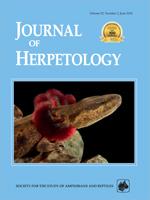Long-term interactions often shape predator–prey relationships in the form of a co-evolutionary “arms race.” The arrival of nonnative species may disrupt these relationships by introducing novel behaviors that shift interactions in favor of one of the participants. Here we investigated the response of an imperiled native predator, the Eastern Hellbender (Cryptobranchus alleganiensis), to nonnative and native crayfish prey. Crayfish constitute an important prey item for hellbenders, and in the northern portion of its range where this research was conducted, the nonnative Rusty Crayfish (Orconectes rusticus) has become the dominant crayfish. The objective of this study was to determine prey choice and feeding success of hellbenders presented with native (Allegheny Crayfish; Orconectes obscurus) and nonnative (Rusty Crayfish) crayfish prey. We tested hellbender chemoreception in discriminating between the native and nonnative prey, analyzed behavioral interactions between hellbenders and crayfish during video-recorded trials, and assessed hellbender selectivity of crayfish during overnight feeding trials. Hellbenders were able to discriminate crayfish odor from controls, showed a preference for the scent of native crayfish over nonnative crayfish, and were more likely to strike at native crayfish than at nonnative crayfish; however, more nonnative crayfish were consumed during overnight feeding trials. This discrepancy apparently resulted from differences in avoidance behavior between the prey species; native crayfish engaged more in predator-avoidance tail-flip responses and climbing retreats than the nonnatives, who tended to “stand their ground.” Accordingly, during biotic invasions, food preferences of native predators may be superseded by antipredator prey behavior.
How to translate text using browser tools
16 April 2018
Hellbender Prey Preference Is Superseded by Native and Nonnative Prey Behavior
Zachary A. Cava,
Amy M. McMillan,
Christopher M. Pennuto,
Robert J. Warren
ACCESS THE FULL ARTICLE

Journal of Herpetology
Vol. 52 • No. 2
June 2018
Vol. 52 • No. 2
June 2018




